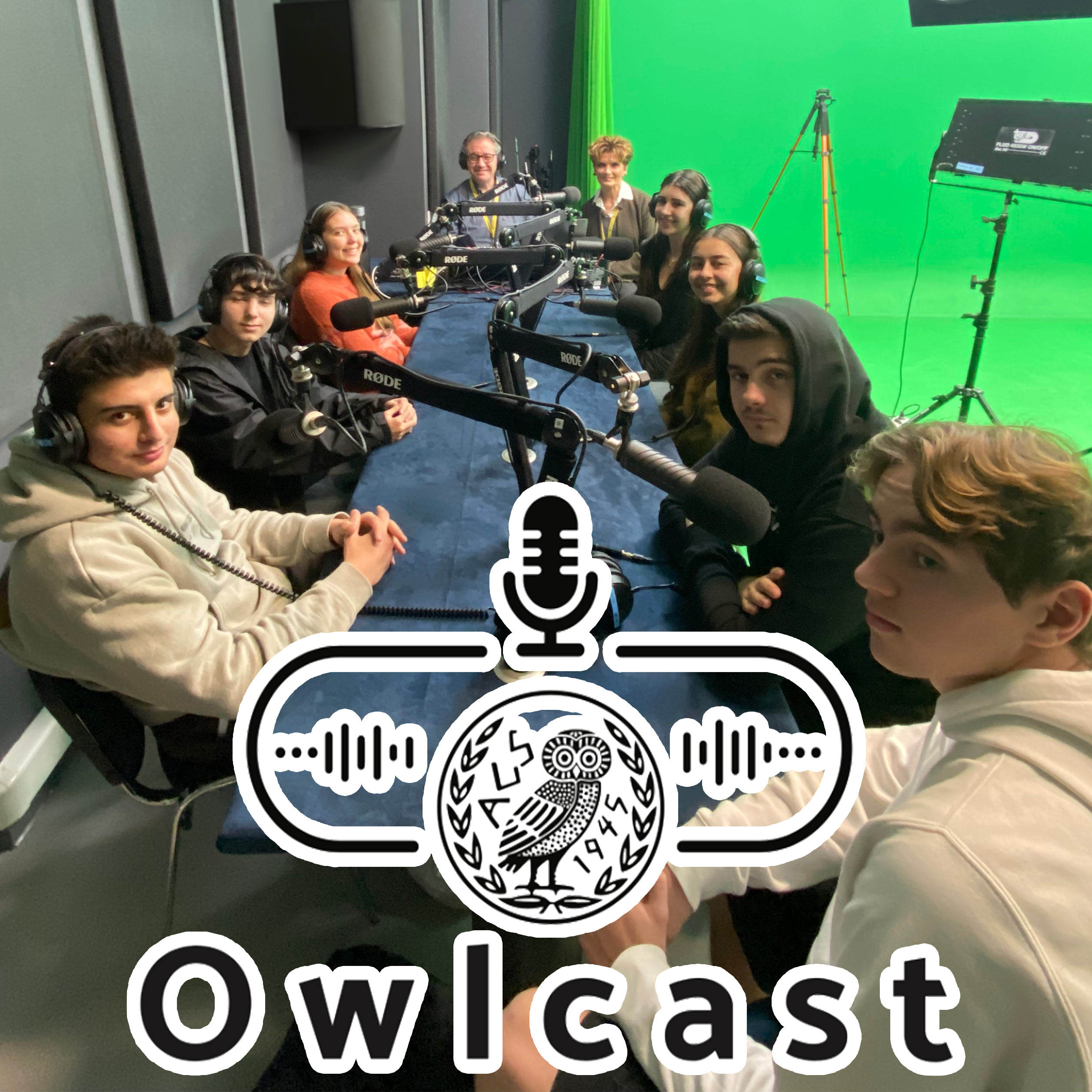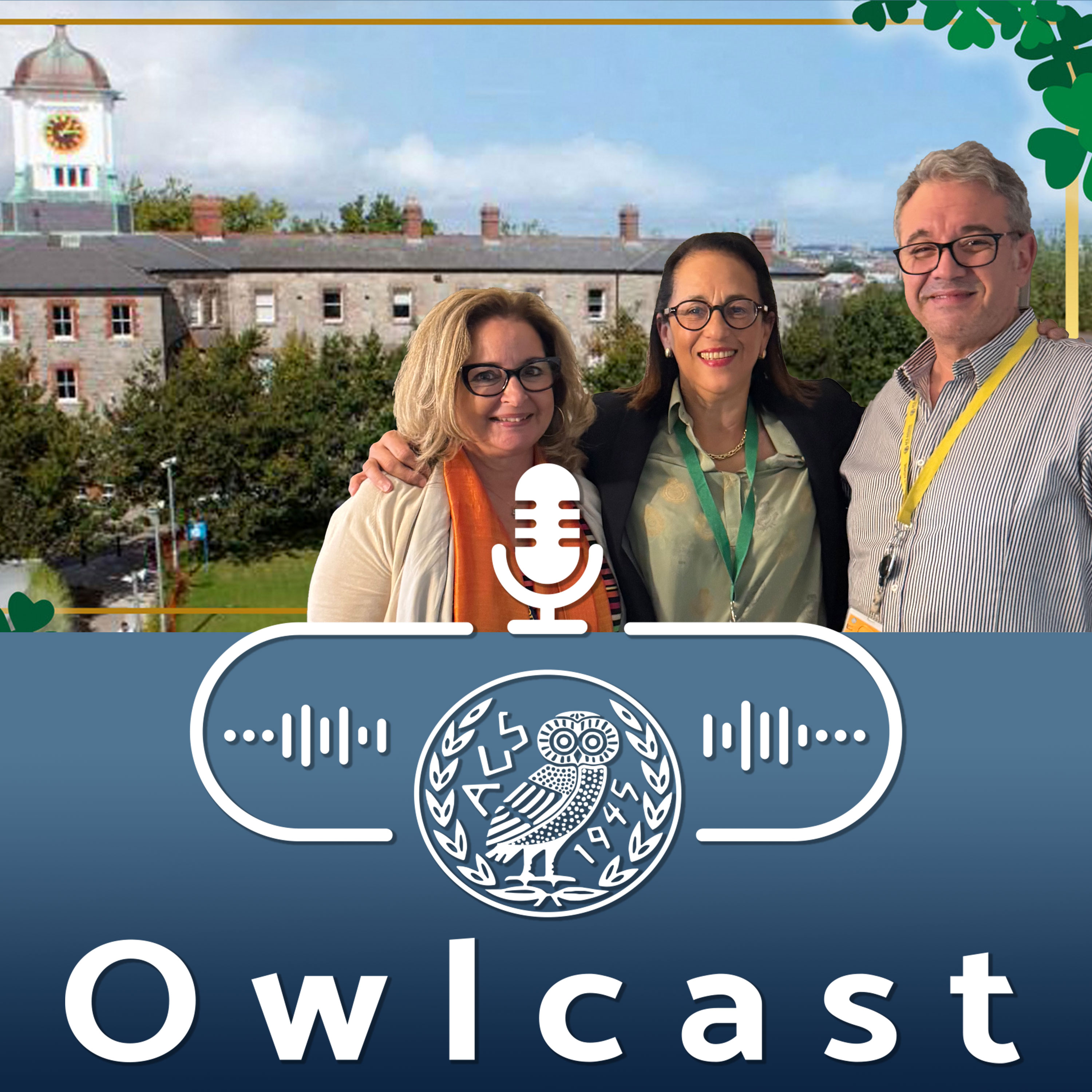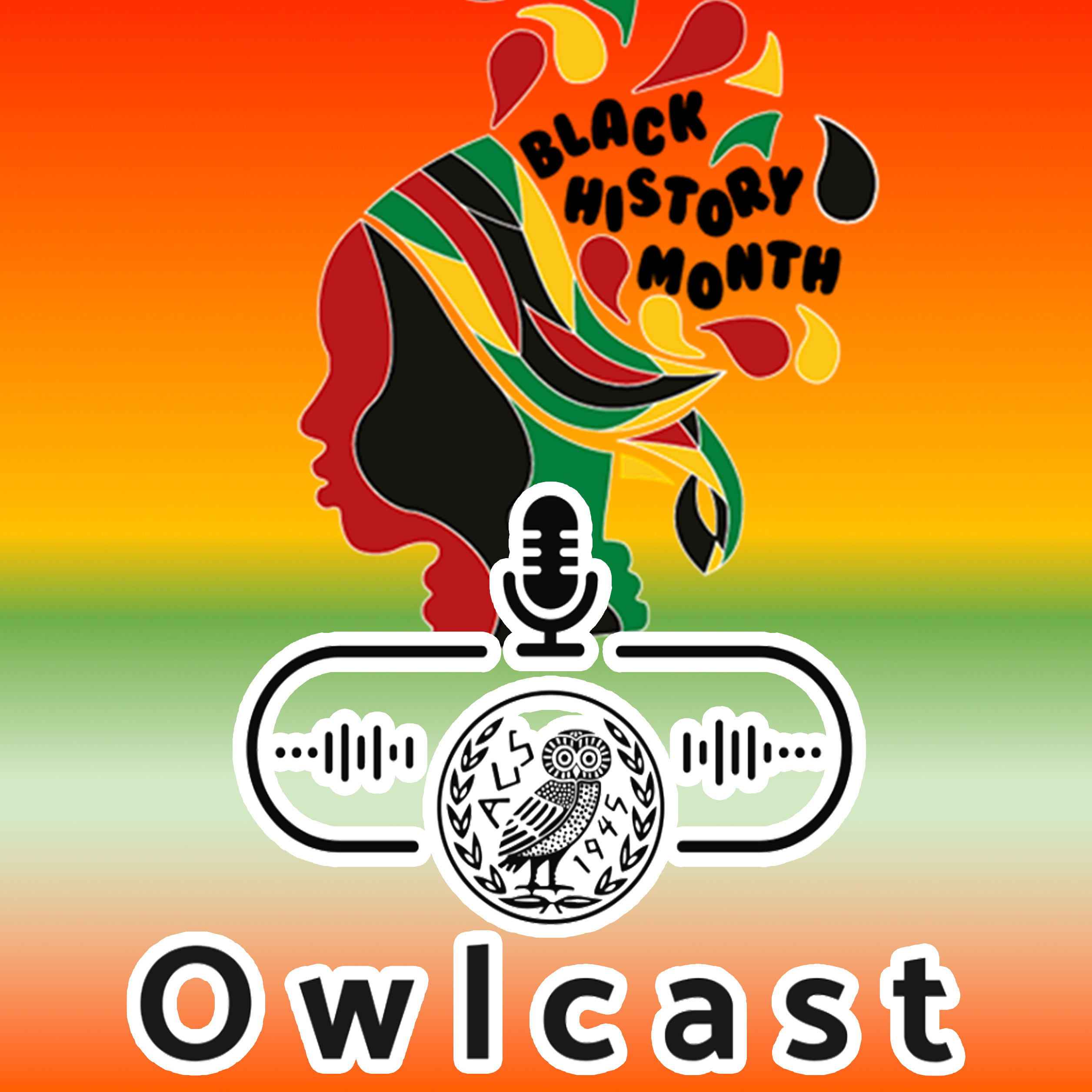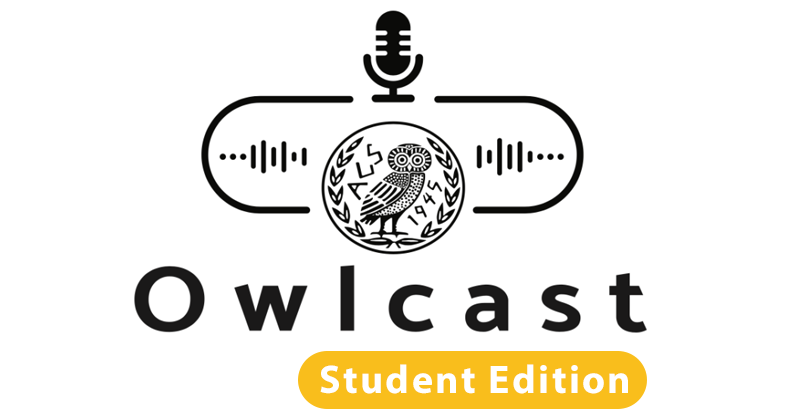Episode Transcript
[00:00:10] Speaker A: This is the owlcast, the official podcast of ACS Athens.
This is the student edition. Listen to the exciting story of the american community schools of Athens.
Check out what drives all the members of our international community of learners as we create the education of the future.
Here's John Papadakis.
[00:02:57] Speaker C: We had the privilege of attending Thyman 2024 in January, on the 22nd through the 26th. Ms. Hamaswekides and I are the advisors of model United nations at ACS Athens. We meet with our students on Wednesdays during lunch throughout the year to prepare them for the two conferences that we attend as a school. Now, Thymen is the Hague International model. United nations takes place in the Hague, of course, in the world forum we had two delegations, Colombia and Cuba, as well as four student leaders. In our history with Thiamin, we have never had four student leaders. These students are selected by the Thiamin board because of their skills, because of their knowledge, because of their experience, and they're invited to take on special positions to lead the conference. So we had a student in the International Criminal Court. We had a student in the International Court of Justice. We had a student in the topics for Ukraine. We had our chair and two ambassadors.
[00:04:22] Speaker B: What is the significance of Thymon versus other Mun organizations? Why is it so respected?
[00:04:30] Speaker C: Thymon is the biggest conference, the biggest model united conference in Europe.
It takes place in the Hague. Over 3500 students attend and over 200 schools on a yearly basis, only from.
[00:04:48] Speaker B: Europe or from other continents, too, from.
[00:04:50] Speaker C: All around the world. The equivalent in size on the other side of the world is the Harvard conference. So we've been one of the longstanding schools to attend Thiamin. We were one of the first schools in Greece to attend Thymin, and we're continuing strong today. We have our Thiamin 2024 team with us. Part of our team, we have Kathleen, Ileana, Dimitri, Dennis, Basam, Nikiforo and Carolina.
[00:05:26] Speaker B: So if we start the discussion by describing, in your eyes, why did you decide to join this team? And we're going to go around talking about your experiences from this. First of all, is it your first time, is it your second time, and where are we from? Your position, what did you represent? And a little bit of story of the particular representation.
[00:05:50] Speaker D: So Simon was my 19th Mun conference. And in general, Mun is an experience that really shapes you as a person. It really gives you cultural awareness and awareness of the world around you. And especially with Simon, it's one of the largest conferences in the world with people of so many different nationalities. You truly get to change the way you perceive the world and those around you, and it really makes you more of, like a global citizen.
[00:06:19] Speaker B: Why did you decide to join the mun?
[00:06:22] Speaker D: I joined to improve my public speaking skills, but now it's so much more than that. It's about meeting all these new people and all these new experiences.
[00:06:32] Speaker B: Okay.
[00:06:33] Speaker E: Other than what Kathleen said, which is very true, there's also something about Mun conferences in general. And it's on a personal basis, the people you meet, actually not only the skills you develop. And until today, even though Simon is in the Netherlands, until today, if I'm walking around in Greece or I'm going out or something, I still meet people who I knew from Thiamin, which is very interesting.
[00:06:55] Speaker F: And to add to both what Kathleen and Basam said, thiamine this year had over 3500 kids. So you get to learn about a lot of different cultures and nationalities while you get to meet these people. And specifically, I remember my first diamond conference that was online when I was in 9th grade.
[00:07:13] Speaker B: So that's also your third?
[00:07:15] Speaker F: Yes, my third. Thyman. I still see people in Thyman conferences from back then, and it's nice to see familiar faces and all that.
[00:07:24] Speaker G: Yeah. For me, it was really cool meeting new people every single day at like from completely different places. And I got to see a best friend I had from a really long time ago who is in a completely different part of the world. And so for me, the most exciting part of Thyman was meeting all the people.
[00:07:41] Speaker H: I agree with what everyone else said, and that Thyman is especially unique because of how diverse it is. I think there's 200 different schools participating with 3500 people. So you get to meet people from every part of the world and it's really interesting.
[00:07:57] Speaker E: Yeah. So I also had lots of fun in Mun. It was very nice meeting lots of different people. And in addition to what Dennis said, each of these schools, also lots of them are international schools as well. So then again, I met people from countries that aren't in Mun, who are from those nations, but simply go to international schools from other countries. So I got to meet some people I wouldn't really expect to meet during the conference.
[00:08:22] Speaker I: With what Basam said. I totally agree. Right. From Mun, even here in Greece, we know that if you go on the streets, right, if you go, like, if you're walking around, you can probably see some people that you were in Mun, right? For example, ever since last year's thymen, I've still kept in contact with people from Thiamin, from other parts of the world. They came here during summer. I saw them for a bit before they had to go. We hanged out together. So it creates also bonds and friendships that can last.
[00:08:50] Speaker B: Well, that prompts me to my question. Do you remember a memorable meet that you did with someone from another school, either this year or previous years? Why is this stuck in your mind?
[00:09:03] Speaker D: In my first alignment three years ago, I was in the same committee with this girl from another school in Greece. And ever since then, in other Mun conferences we've chaired together, we've lived all our Mun experiences together. And it's so nice to grow with a person throughout this kind of journey and see how you develop together through different positions in Mun and through different understanding critical thinking.
[00:09:28] Speaker F: Also, in the summer of my 9th grade year, I had met a girl at a pre summer program who I became close with. And then that following year, I saw her at Thymin. We were in different committees, unfortunately, but this year it was nice, because we planned it, and we were in the same committee, so I really got to see her. And she's a year older, so she's graduating, so it was her last year. Being part of Thymon.
[00:09:51] Speaker E: For me, Thymon also extends to other extracurriculars. For example, someone I met, which was my chair when I was a judge in Psmun. He was also in a debate competition I was at, and we also worked together there, so I found it interesting.
[00:10:09] Speaker B: Okay. All right, so let's go around and talk a little bit about your participation. For example, what country did you represent? You go to these organizations, to these events, and you are prepared to represent a country. Correct. For a particular topic? For a particular issue, or you follow the discussion, and then you decide what to represent and how to represent it. How is that working?
[00:10:37] Speaker G: So I was Cuba, an environmental committee, too, and so they had already chosen the issues we were going to discuss, which was the permissibility of gmos, genetically modified. Genetically modified organisms like in food, the negative impacts of sustainable energy, and measures for protecting marine mammals. And so my role was to research Cuba's position on those issues and to come to the committee with solutions that my country would put forward.
[00:11:05] Speaker B: Very briefly, what was Cuba's position?
[00:11:08] Speaker G: Well, so we were kind of neutral on gmos. For me, the most memorable thing was on a resolution for marine mammals. One delegate suggested only shipping oil over landlocked countries. And for Cuba, this was pretty unacceptable because we're an island nation, and a big export for us is oil. So I made an amendment against that, and it actually passed. So I was pretty happy with that.
[00:11:34] Speaker B: Excellent.
[00:11:35] Speaker E: I was the panelist for the European Union in the special forum on Ukraine, which had the topics of rebuilding ukrainian infrastructure, protecting ukrainian cultural heritage, and reaffirming their sovereignty.
[00:11:47] Speaker B: So what was your position? What was your activity in that committee?
[00:11:51] Speaker E: Well, being a panelist, it was like a delegate, though it was supposed to be considered a bit more higher up than that. And being representing the European Union, I was pro Ukraine on the topics, and I proposed clauses to the resolutions we were creating that were in favor of Ukraine and were in accordance with the topics.
[00:12:14] Speaker B: Something that made an impression to you from that topic?
[00:12:17] Speaker E: I won't really say there was something that made an impression from that topic. However, I'd just say that it was very interesting because it was my first time being in a special committee that just has one specific issue, one specific topic, which in this case was Ukraine.
[00:12:32] Speaker B: Okay.
[00:12:33] Speaker E: I was the ambassador of Saudi Arabia, which is a delegation, and about ten people, I think in our school were Saudi Arabia. And as Saudi Arabia, one of the most memorable things we discussed was interest. One of our subtopics was reducing global inflation through interest in many measures. And the most memorable moment for me was in that topic, where I had to lobby a lot for specific resolutions with middle eastern allies, and especially because, as one of the biggest oil exporters in the world, many of the resolutions that we had signed on were trying to get amendments to make price caps for oil or specific inflation rates, which I had to lobby a lot against as Saudi Arabia.
[00:13:17] Speaker B: So did you actually research on the topic of inflation or in general, about the Saudi Arabia position?
If I ask you right now, do you understand the inflation topic more than before you went? What would you say?
[00:13:31] Speaker E: Yeah, of course. And looking at it in the scope of Saudi Arabia also helps understand it in many different.
[00:13:38] Speaker B: Excellent. Excellent.
[00:13:39] Speaker H: So I was personally the delegation of Cuba, and I was in the same committee as Basam. So we were talking about addressing illegal wildlife trade, the impacts of global inflation, and secure social and financial resources in an aging population. And as Cuba, we were in favor of addressing all of these issues, but we had to specifically decide on how they would be addressed, and we were mainly in favor of protecting our own economic resources.
[00:14:11] Speaker I: I was a judge for the International Court of justice this year, due to Simon being cut one day short. We had one advisory case and then one normal case. Our advisory case was Palestine versus the United States for the relocation of the embassy from Jerusalem to Tel Aviv. And our normal case was Honduras versus Belize, about the Caios Apatillos islands.
[00:14:34] Speaker B: Okay, so if I asked you, is it more difficult or easier to be in the international court as a justice than to represent a country, what would you say?
[00:14:44] Speaker I: In my opinion so far, since I've done both? It's way much harder to be a.
[00:14:49] Speaker B: Judge because you have to see both.
[00:14:51] Speaker I: Sides, not only because of that, but because of how much work you have to put and how much you have to take in consideration the evidence. You have to make sure that there's no burden of evidence from any side. You have to make sure that the evidence is posted up to a specific date, and it goes to the smallest of details possible in order to even make your first judgment, because after first judgment, then you question both sides, the complainant party as well as the respondent party. And then after that, you have to make your second judgment, which is what you vote for.
[00:15:22] Speaker B: So there's a whole process that you have to.
[00:15:24] Speaker I: There was a very big process. We were assigned each a piece of evidence you had to analyze it and go into specific detail about it, then return it back to the registrar. The president, deputy president, went into detail for that. So there were a lot of multiple stages to even go for final voting.
[00:15:40] Speaker B: There's a lot of work. There's a lot of work. Okay.
[00:15:42] Speaker E: I just wanted to say for 1 second, because of what Dennis said, that sometimes you're also a bit passive to listen to other countries because, for example, he was talking about the aging population and Saudi Arabia, the average age is around 30, I'm pretty sure. So we really didn't have any problem with that. So sometimes you're a bit more passive and you're listening to other countries views and debates.
[00:16:02] Speaker B: I like that you're talking in first person. I like that.
[00:16:05] Speaker F: So I also represented Saudi Arabia. I was in human rights Commission subcommission, too. And some of our topics were regarding women's equality and regarding religious intolerance, which was really interesting for me personally because I always like doing human rights committees. But also it's issues that you get to see so much in the modern world, especially. So having the opportunity to draft resolutions on how to fix this, I think really broadens your horizons, kind of, on what's happening in the world as well.
[00:16:37] Speaker D: I was chair or president for Specon, the special committee on Peace, Law and Justice for the UN, which means that I didn't represent a country, but instead I organized the committee and facilitated the debate, which means I had a lot of preparation from before the conference for the committee, including choosing the topics, learning about all the other countries in my committee, so I can facilitate the debate properly and learning about what it is that each country should do. And so, yeah, one of our topics was about enhancing the ICJ, which is quite interesting because Dimitri was working with that as well, and about how we, as a committee and as a UN, we can strengthen the ICJ.
[00:17:26] Speaker A: You are listening to the owlcast, the official podcast test of ACs Athens.
[00:17:43] Speaker B: In your participation in the thyman and thinking of what you want to do after school. After high school. Okay, all of you except one are 11th graders, but I'm pretty sure that everybody is thinking a year, two years from now, what element from your participation do you think is going to benefit you or that you're going to carry with you as you go forward to what you want to study?
[00:18:10] Speaker H: For me personally, there's actually not much alignment between Simon and what I want to study because.
[00:18:16] Speaker B: What do you want to study?
[00:18:17] Speaker H: I want to study mechanical engineering. And in Mun, we're talking primarily about politics, international relations, or there's no politics in mechanical engineering?
[00:18:28] Speaker E: Well, there.
[00:18:29] Speaker H: Not so much. But regardless, I still find it to be a super valuable experience because of the connections you make and the skills you develop in debating, public speaking, which are of paramount importance. I mean, in whatever you do in the future.
[00:18:43] Speaker B: Excellent.
[00:18:44] Speaker I: I believe that for me, mun as a whole, and what I do want to study, which is strategic studies and defense analysis, does play a big role. Why? Because one, it's politics for both. Two, Mun helps me enable and then fix as well my critical thinking as well as problem solving, since that is the two points of what I do want to study. So I believe that it's going to make a big and vital role, as it's going to be very important for me to understand and actually be able to manage on how those two aspects and the fields will mix together with what I want to major in.
[00:19:24] Speaker D: Well, I want to study politics and international relations, but I came to that conclusion because of Mun. Because I was enjoying learning about these topics so much, and I enjoyed talking about them and what it gave me as a person. I came to conclusion that I wanted to study politics. I think it really has shaped me as a person.
[00:19:43] Speaker B: Well, there's a lot of politics in politics. Okay.
[00:19:46] Speaker G: I'm definitely considering studying international relations or something similar, but I also think that a big part of Emion is learning to interact respectfully with other people, which I think our society definitely needs more of and is very important, no matter what field you go into.
[00:20:05] Speaker E: So I'd like to be a diplomat in the future. So I'm also planning on majoring in international relations. And because of the points that Dennis and Dimitis brought up earlier about critical thinking and those sorts of things, like how Mun benefits people, I believe that through that, Mun can help me learn more about international relations and be a bit more comfortable in being aware of the subject or whatever.
My case is extremely similar to Dennis's, but still, these are skills that you use personally and you use throughout life. No matter what your major, no matter what you do, you're going to use it everywhere. So, great win situation.
[00:20:43] Speaker F: I agree with everything, especially Dennis's critical thinking point. So I want to study public health and public policy. So Mun plays a major role, especially when it comes to learning how to draft resolutions and learning how to find solutions to these crucial issues.
[00:21:00] Speaker B: And it gives you perspective. Correct. So it's not just what I do, but what's the effect, what's the outcome for the wider community.
I am a 9th grader right now, and I see a lot of students from my friends that are going into this particular activity. But I have no idea what you're saying right now. Maybe might give them an idea, might give me an idea. So from your perspective, not what you benefited from, as you described, but what would benefit me as an incoming freshman in high school who has no idea about this thing, what would you say to me to convince me to get into this activity, to this group?
[00:21:46] Speaker F: I would firstly say you could always start from a smaller conference. So, because thymine can seem very intimidating, especially for someone that's just starting, Mun, you could start from a smaller, more local conference in Greece and then see how that goes and focus on really working on your policy statements and your view on things.
[00:22:08] Speaker H: It's like we were saying before as well. I mean, no matter what you want to study in the future, or if politics interests you or not, there's always something that Mun can offer you. You can gain leadership skills, public speaking, critical thinking, like Dimitri said. Or if you do want to study politics, it's really valuable because you get to understand how policy really works. And also, just as a global citizen, you get to understand the perspective of a million different nations and really get a different understanding of the world. So there's always something.
[00:22:48] Speaker E: Okay. Mun is great for anyone who likes debating a lot and just likes problem solving and working towards finding sustainable solutions to issues.
[00:22:57] Speaker B: This is a provocative answer because I need to ask you, do you actually give solutions with your participation?
[00:23:03] Speaker E: We do, yeah. We try to make clauses and resolutions which solve the issues that our topics are concerning. I mean, most of the things have been covered, but yeah, worst case scenario, if you don't really enjoy it, at least you made some friends.
[00:23:15] Speaker I: I want to add, with what Ileana said, right, that. Sure, starting with Simon, it's probably way too big, right? For example, my first conference was Simon. I was way too excited for it, right? It was way too big. I was like two steps behind of everyone. I didn't know what was happening. Yeah. Like Ileana said, I suggest that you start with something smaller, especially if you're here in our school. I suggest by going first to Psmun or going as an individual delegate by yourself to some other schools, right. So you can understand at least the basics. You're going to get flooded with all the point of interest, point of parliamentary or inquiry.
It's too much for your first one to go into a really big thyman. You're going to get mixed up real fast.
[00:23:55] Speaker G: So this year, Thyman actually was my first conference, and I agree with what everyone has said about it being overwhelming. I would also recommend just getting started as soon as you can. As a freshman, I think is a great time because as a junior, I've seen certain positions in mun, like chairing and stuff that I would really like to do, but it takes a long time to build up to those roles. And so if you get started earlier, you can get to those cool roles sooner.
[00:24:21] Speaker C: We had a wonderful group of 24 students. This is only the tip of the iceberg of our model United nations team. Our next conference is in March with platinum school. But these guys here are also experienced.
They're the leaders of our group. So, so proud of you guys, each and every one of you.
[00:24:41] Speaker E: Thank you.
[00:24:43] Speaker B: I think you convinced me to join Simon.
I don't know if we have any other opportunities this year, but thank you so much, guys. I mean, this is really interesting to hear the different perspectives, and I think everybody's going to benefit from this, whether you're a mechanical engineer or you're going to become a judge or anything you go around to do in the future. Thank you so much.
[00:25:07] Speaker E: Thank you.
[00:25:08] Speaker H: Thank you.
[00:25:11] Speaker A: You are listening to the Owlcast, the official podcast of ACS Athens. Make sure you subscribe to the Owlcast on Google Podcasts, Spotify and Apple Podcasts. This has been a production of the ACS Athens Media studio.



